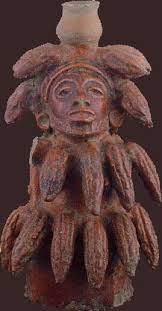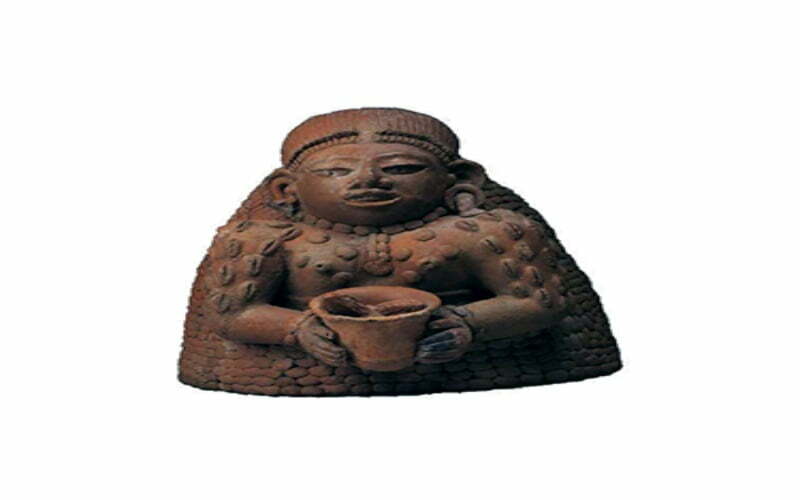The Goddess of Chocolate had humble but honorable origins as a Mayan Goddess. Named IxCacao, she was an ancient fertility goddess, an earth goddess in a matriarchal society where gathering crops and seeing to it that everyone was fed was a woman’s work.
Banishing hunger and providing for the safety and security of the people was her divine responsibility.
The Creation of Humankind
The creation myths told of a great flood, devastating droughts, and earthquakes that destroyed the gods’ four previous attempts to create a race of humans that would love them and sing songs about their glory.

After all, the human race had been decimated by cataclysmic events before, this wasn’t the first attempt by the gods to repopulate the world with humans who, like them, could think and speak, creatures who would be grateful to them and honor and praise the gods for giving them their lives.
The Grandmother, the goddess Ixmucanè, was worried. Her two sons had been killed while off on an adventure in the Underworld. Like many grandmothers today, Ixmucanè was left to rear her grandchildren.
Since the women did most of the work planting, harvesting, and cooking, the grandsons had a lot of free time on their hands, time to explore the professions and the arts and to play with politics.
Although her grandsons were both fine boys, and she was very proud of them and their achievements (they were fine architects, musicians, sculptors, and artists), she couldn’t help but fret that something very vital was disappearing from the world and that, eventually, there would be a day of reckoning.
The Last of Her Kind
For Ixmucanè was the last of the soothsayers, the ones who had the knowledge and were wise with the knowledge in the ways of the Earth, ones who could feel the rhythms of Nature coursing through their veins. Ones who were ‘seers’ had the gift of foresight and knew how to manage their awesome responsibilities for the earth wisely.
”What would happen,” she worried, “when she grew old, and the last of her kind died out?” Occupied by these dark musings, she was startled to look up and find a pregnant young woman standing before her.
The Story of a Pregnant Young Woman
The young woman approached the old goddess reverently and took a long, deep breath, trying to work up the courage to speak.
”Grandmother, I carry within me the children of your son who has gone to the heavens. My father, the Lord of the Underworld, says I have shamed him and cast me out. I have nowhere else to go. Please take me in and let your grandchildren have a home with you.”
”How could my son be the father?” asked Mamma Cane. “Both of my sons died in your land.”
”My name is Ixquic or ‘Blood Moon.’ I was there under the calabash bush when your son Hunahpu was decapitated by the soldiers. His bloody head continued to talk to me after he died. It spat upon my hand, and it was this that caused me to conceive these twins.”
Not in the best of mood to begin with, Ixmucanè was understandably skeptical. “Just another gold-digger,” she thought, “Who knows who the real father of those babes was?”
Ixmucanè puts Ixquic to the test
But, just as the Greek goddess Aphrodite did to her daughter-in-law Psyche, Ixmucanè set a test to learn if what the young woman said was true. She would, after all, be pleased to add to her bloodline if the unborn twins actually were seers like she was — indeed, the future of the kingdom might even depend upon it.
So she gave the young woman a big net and said, “Here, take this to my field, and don’t come back until it’s full of food.” Full of confidence that she could easily do this thing, Ixquic headed for the field, where she then found that there was only one plant growing, a single cob of wild corn.
What was she to do?
Dropping to her knees in despair, she called on other goddesses for help.
Ixcanil, Goddess of Seed, hear me.
Ixtoq, Goddess of Rain, help me.
Ixcacau, Goddess of Chocolate, see my tears
and come to my aid.
They came quickly to her rescue.
Ixcanil taught her how to pluck the seeds from the one cob or corn and blessed them so they would sprout. Ixtoq brought the nourishing moisture they needed to grow. And IxCacao, the Goddess of Chocolate, taught her how to plant the seeds and cultivate and harvest the corn.
Then IxCacao stood on the lower hillsides surrounding the valley, guarding over the quick-growing plants until the valley was filled with their ripening stalks.
When it was done, Ixquic returned with her net overflowing…enough food for a feast. Seeing the miracle, Ixmucanè welcomed her into the family.
The Birth of Sacred Twins
Now when the Winter Solstice arrived, it was time for Ixquic to give birth. She went into the woods alone, as was the custom, and soon delivered two sons who were to become the Sacred Twins.
Although they were not revered as major deities themselves (more like superheroes or demigods), the twins played a vital role in the creation myths. Clever lads and not above a bit of trickery, they defeated the forces of the Underworld as well as other enemies of the gods and were greatly favored by the deities.
The oldest son was named Hunaphu after his father. In some tellings of the myths, he was actually the reincarnation of his father, who had come back as a human and would eventually, in Christ-like fashion, sacrifice his life to save mankind. When taken to the heavens, Hunaphu became a sun god.
The younger brother, Xbalanquè, was associated with the full moon and upon his death, signifying the end of matriarchal times and the emergency of the patriarchal, he was changed into a woman and became Ixbalanquè, the moon goddess.
The Goddess of Chocolate As a Religious Icon
Providing the Food of the Gods to the Patriarchy
Though she seldom made a public appearance in the myths, IxCacao, the Mayan Goddess of Chocolate, had been loved by the common folk as a compassionate goddess of abundance.
Like the Greek goddess Demeter, she had walked among the people and understood their suffering and fear of starvation while graciously giving them the knowledge and tools they needed to not only survive but to craft a life of abundance for themselves. (Not to mention generously sharing the exquisite taste of chocolate and the energy it gave them to keep on working!)
But that was soon to change! At first, it seemed like a golden age. Kings and dynasties appeared. A ruling class was born.
Astronomy flourished, as did the arts. Writing (glyphs) began to appear on the magnificent monuments, palaces, and temples of the kings and many of the nobility. Large cities were established and populated with wealthy people.
IxCacao Gets Banished
Each king functioned as a high priest. Asserting his family relationship with the gods would enable him to promise to bring rain and prosperity to his kingdom. Which is why the peasants were willing to work to support the luxurious lifestyle of the king and his court.
Then poor IxCacao was whisked away from the fields to marry Ek Chuah, the God of Commerce. Soon her lovely cocoa beans were being turned into currency. 40 beans would buy a donkey, 100 a reasonably good slave. The workers’ taxes even had to be paid with the beans, leaving them few, if any, to enjoy for themselves.
The women and children could no longer enjoy chocolate anyway. It was now forbidden and declared the ‘food of the gods’. Made available only to the rulers and the warriors in their service. It nearly broke Ixcacao’s heart. She knew there was little she could do about it, but she summoned up her courage and made one demand.
The Human Sacrifice
Both the gods and the humans were required to sacrifice their lives. All in order to preserve their world and the lives of the people in it. Four times before, the gods tried to create human beings who would love them and share this burden with them. But they had failed, so god had to destroy those worlds.
This time, in the fifth world, the gods gave the world light. Only possible because two of the gods had been willing to sacrifice their lives to create the Sun. If the Sun ever stopped moving through the sky, its blazing rays would quickly destroy the earth.
Only the heart and blood of a god or human could quench the hot Sun’s thirst and renew its energy. Forever keeping it moving through the sky.
Living as the Chosen One for a Year
So each year, the rulers chose a young boy to be sacrificed. In some places, it was a young girl or even a chocolate-colored dog. They would exchange the drab life of a peasant to be dressed in fine clothes and given servants and tutors. In short, they got to live like a god.
But just for one year. On the anniversary of his selection, all the people would come together at the temple pyramid. The boy would ascended the steps to the top and give his heart and his blood to the Sun.
The compassionate IxCacao knew that, even though they were proud and brave, the Chosen Ones still trembled with terrible fear as they started up the steps. ”I will go with them,” she demanded, “and comfort them with my presence in their final hours.”
And so the Goddess of Chocolate climbed the steps beside them, offering them comforting goblets of cocoa along the way. Thus she became an important part of the sacred rites each year.
Huitaca’s Speech
One year IxCacao descended the pyramid steps, doubting that she could bear to ever do this again. But when she entered her dressing room, much to her surprise, there stood Huitaca, the Goddess of Love and Pleasure.
”Friend, we need to talk,” Huitaca said. ”You always lived very close to the people. I’ve seen you welcoming them home from the fields each night, joining them as they gather around the campfire to roast the corn, telling stories, and enjoying your gifts.
But now they have to work so hard and so late into the night that they fall asleep straight away, and it’s a deep and dreamless sleep that does not refresh. Gone is the laughter that sparkled up to the stars as their told their stories around the campfire at night.
Gone are the flowers and animals they embroidered on their dresses. Gone are the bright colors that made their blankets so warm and so bold. Gone are the music and dancing that reflected the beauty of their goddess into the nighttime sky.
And gone is the joy that made working worthwhile. It is all gone, and I can not bear the thought of it. I need your help. We’ve got to come up with a plan.”
The Plan
And what a clever plan it was. IxCacao would teach the kings’ cooks how to ferment the wine and make it intoxicating. She ‘let it slip that it was a powerful aphrodisiac.
Not hard to convince them of that! No wonder modern guys like to gift chocolate truffles. After all, chocolate contains the same chemical that gives you that wonderful feeling of falling in love.
Greed Started Destroying Everything
Then came a time of unbridled gluttony and warfare between the various states. Emperor Montezuma was even reported to drink 40-50 goblets a day. Soaking up the aphrodisiacal stimulant of the cocoa to sustain his energy for his daily visits to his harem.
The aristocrats began to regard labor of any sort as beneath their dignity and lived in their fine palaces, oblivious to the human suffering on which their lifestyles depended.
Kingdoms rose, and kingdoms fell. Weakened by war, the Mayans were defeated by Aztecs (from the region of Mexico). Fortunately, the Aztecs admired their religion and incorporated the goddess of chocolate into their own.
Just as Ixmucanè foresaw, no one with authority was paying attention to the rumblings of the earth. Too many people with too little land available for growing crops. What land there was couldn’t produce food because the workers were busy warring. The people were malnourished or starving.
The Fall of an Empire
Weakened by their excess and their constant warring with each other, they couldn’t put up much of a fight. When the Spanish explorers and conquistadors arrived, bringing with them a foreign “pox” all was lost. It nearly wiped all the people out.
And then the Spanish priests burned all the books that told the stories of the creation myths and most of everything else which they had been so proud to learn.
Later came other priests, ones who would encourage them to record their stories and their myths. Only they insisted it had to be in Latin, the language of the Spanish church. But by this time, much had been forgotten.
The Last Hope
But all was not lost. One of the old gods returned. Having once died in sacrifice to the Sun, he came back in human form. Much like the Spaniard’s Christ, he gave his life again. This way the people would never need to sacrifice their lives to the Sun again. The practice of human sacrifice ended.
Well, it couldn’t be helped that some things had turned out badly. But Huitaca, the Goddess of Love and Pleasure, was grateful for the role that the Goddess of Chocolate had played. And to show her great favor, she adorned her from head to foot with delicate white blossoms that fluttered in the gentle winds.
And so, covered in beauty, IxCacao, the Goddess of Chocolate, was allowed to return to her people. This time as both the fertility goddess who stood watch over the fields of corn and saw that her people were fed, but also as a queen of love and pleasure.
No more work without rest.
No more work without time for family and friends and time for music and dance.
And above all: no more work without love.
Legacy of IxCacao
IxCacao’s wisdom is a lovely counterpoint to the production-oriented hustle of our modern world. There are alternatives to its frantic buying and selling for profit and greed. The Goddess of Chocolate reminds us that a luxurious world unfolds before your eyes. All you need is to take a moment and rejoice in those things which give you pleasure.
IxCacao Symbols
The most common symbols of Ixcacao are, of course, cacao beans and chocolate, but this goddess was also associated with fertility, so many other symbols can be used to represent her.
General
Because it is made from cocoa beans, chocolate is one of the biggest symbols of IxCacao. Chocolate symbolizes passion, love, joy, luxury, abundance, and good fortune.
Some other symbols of Ixcacao are wine, sun, gold crown, and crescent moon.
Animals
She was not only the goddess of chocolate, IxCacao was also the goddess of fertility. That’s why her animal symbols are rabbits and hares, animals that are known for their fertility.
A snake is another animal often associated with Ixcacao, symbolizing her wisdom and her desire to share her knowledge with people.
Plants
Of course, cacao/cocoa beans are the main symbol of IxCacao. Cacao beans symbolize fertility, wealth, power, rebirth, and the afterlife. Originally, cacao beans were considered the food of gods and emperors.
Other beans, such as vanilla, symbolize IxCacao. Her other symbols also include palm trees, corn, maize, and other crops.
Perfumes/Scents
If you want to smell like Ixcacao, applying cocoa butter on your skin is a way to go. Chocolate-based perfumes are another great option. Other scents representing Ixcacao are floral notes, vanilla, coffee, caramel, and coconut.
Gems and Metals
Gold, red jasper, hematite, calcite, and rhodochrosite.
Goddess Jewelry
There are many reasons why you might want to keep a healing crystal or stone close to you. Getting closer to your goddess by wearing her color or crystal is a great one. That they also look great as jewelry only makes it so much better!
Here is a guide to crystal jewelry you hopefully will find helpful. In it is a list of 30+ crystals and links to some really great looking jewelry with that crystal or stone. Enjoy!
Colors
Since IxCacao is the goddess of cocoa and chocolate, her colors are brown, red, and black. Additionally, since she is also the goddess of fertility, she is often symbolized by the green color.
Other Goddesses
If you enjoyed this post we are sure you will enjoy getting to know some of the other goddesses we also write about. You can find the complete list of goddesses sorted across regions and religions here.


